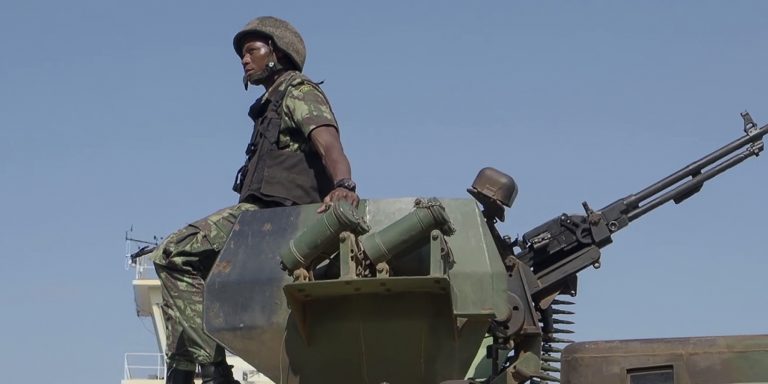INTELBRIEF
March 21, 2024
IntelBrief: Islamic State Resurging in Mozambique

Bottom Line Up Front:
- The Islamic State in Mozambique is resurging after adapting its approach throughout parts of the country, taking advantage of poor governance and myriad grievances of the local population.
- ISIS-Mozambique has attracted foreign fighters from throughout the region, including jihadists from Tanzania, Rwanda, and South Africa.
- Between July 2021 and late 2023, international forces reclaimed territory from the insurgents, although they failed to improve governance in these areas, providing ISIS-Mozambique an opportunity to resurge.
- ISIS-Mozambique maintains the same strategic objectives as other Islamic State affiliates, focused on capturing territory and governing it with the same methodology the group has employed in Iraq, Syria, Libya, Nigeria, and Mali, at various points.
Islamic State in Mozambique (ISIS-Mozambique) is resurging after adapting its approach throughout parts of the country. ISIS-Mozambique cells have moved into the southern districts of Cabo Delgado, which had previously been unaffected by spreading violence. Since December, ISIS-Mozambique has been on a rampage, conducting attacks and kidnappings and displacing more than 100,000 people who were forced to flee their homes in towns and villages in Chiure and Mecúfi districts, among other locales. In January, jihadists took over Mucojo, located along the Macomia coast, and began implementing an austere version of Sharia law, outlawing alcohol and aggressively proselytizing. An attack in early March resulted in more than 70 children being kidnapped. Even with the group’s wanton brutality, it continues to win new adherents, as the Mozambican government has been accused of corruption and incompetence, with weak governance and economic grievances helping ISIS recruit, including egregious levels of youth unemployment and widespread poverty, despite vast resource wealth, including natural gas and valuable minerals used for electric vehicle batteries. The militants have even moved into new areas, recently occupying the town of Quissanga. Islamic State’s central media apparatus has also been promoting its Mozambican branch more lately, indicative of the group’s increased operational tempo and frequency of attacks.
The insurgency in Mozambique began in the northern province of Cabo Delgado in 2017 centered around the Mocímboa da Praia district, which had become an area dominated by extremists and radicals. Islamic State formally recognized Mozambique as an official ISIS branch in May 2022. However, it operated under the broader umbrella of Islamic State Central Africa Province (ISCAP) as early as 2019, which also included Islamic State’s affiliate in the Democratic Republic of Congo (DRC). Originally known as Ansar al-Sunna (and known locally as al-Shabaab, though distinct from the al-Qaeda group with the same name in Somalia), ISIS-Mozambique rampages have included mass beheadings, including of children, demonstrating that the group adopted the most extreme tactics of its parent organization. The group has even attracted foreign fighters from throughout the region, including jihadists from Tanzania, Kenya, Somalia, DRC, Rwanda, and South Africa and has demonstrated the capability to launch cross-border attacks. The more territory the insurgents are able to control, the more attractive Mozambique will become for foreign fighters. It also elevates the importance of Islamic State’s Mozambican franchise in the organization’s global network, which moves money and facilitates logistical assistance between East Africa, the Middle East, and South Asia.
In March 2021, militants launched an attack in Palma, where Total, a major French energy corporation, was developing a lucrative $20 billion offshore liquefied natural gas (LNG) project, the largest on the African continent at the time. This project and other gas operations were suspended due to rising insecurity. In response, in July 2021, the Mozambican government turned to external actors to help stem the tide against Islamic State jihadists. Rwanda deployed police and military forces, while the South African Development Community (SADC) also sent a contingent as part of the Southern African Development Community Mission in Mozambique (SAMIM), slated to end in July. Rwandan forces reached 2,500, and the Mozambican government harnessed the power of civilian-led militias in some areas. International forces made progress against the insurgency, eliminating key jihadist leaders and degrading the organization’s ability to launch spectacular attacks. The insurgency lost dozens of high-ranking commanders to combat deaths and desertions plagued the group. Between July 2021 and late 2023, international forces reclaimed territory from the insurgents, succeeding where the infamous Wagner Group failed. The Russian mercenaries deployed to Mozambique in 2019 but withdrew after a few months after failing to combat the insurgency.
Even where the SADC and Rwandan forces succeeded in reclaiming territory, the Mozambican government failed to improve governance and provision of services to the population in these areas, providing ISIS-Mozambique an opportunity to resurge. Over the past several months, ISIS-Mozambique militants have adapted, moving south and largely shifting their approach to dealing with the local population. In an attempt to “win hearts and minds” among civilians, the insurgents traded goods and bought others at higher than market prices and reassured civilians that their target was the government and the security forces, not locals. Coupled with a cumbersome approach by the government, which included accusations of extra-judicial killings, the insurgents showed resilience and made a deliberate effort to scale back their own abuses of civilians. They began to mobilize for an offensive, putting the counterinsurgents on their back foot. This occurred in parallel with increasing complacency on the part of the security forces and problems with intelligence sharing between the array of forces deployed in the country. ISIS-Mozambique maintains the same strategic objectives as other Islamic State affiliates, focused on capturing territory and governing it with the same methodology the group has employed in Iraq, Syria, Libya, Nigeria, and Mali, at various points. ISIS-Mozambique also uses Islamic State’s distinct sectarian language in its propaganda, declaring war against the “crusader Christian” Mozambican security forces.